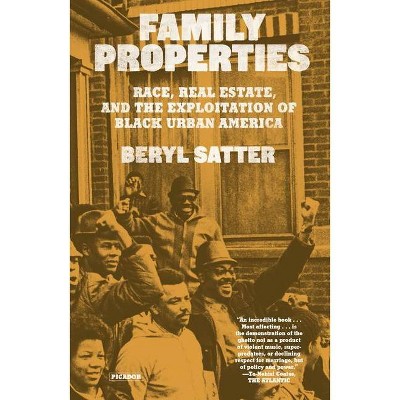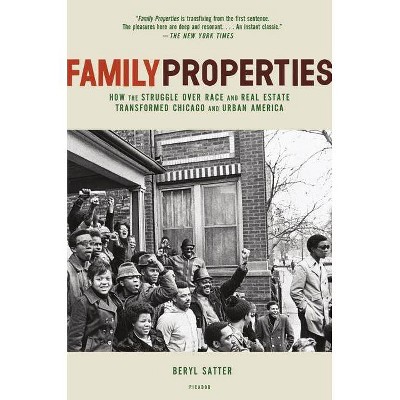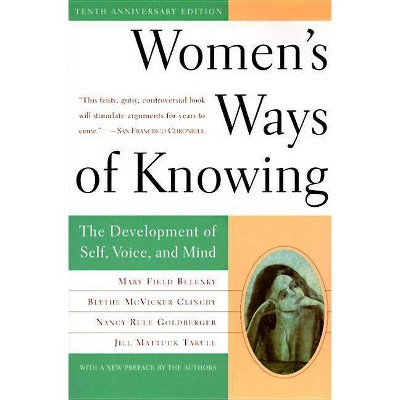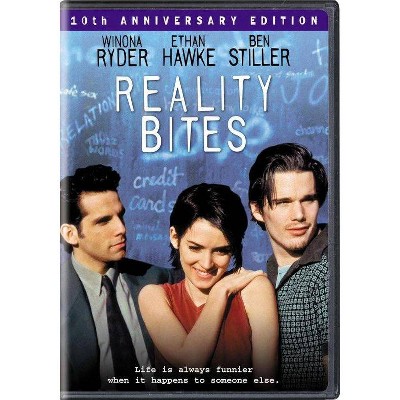Family Properties (10th Anniversary Edition) - by Beryl Satter (Paperback)

Similar Products
Products of same category from the store
AllProduct info
<p/><br></br><p><b> About the Book </b></p></br></br>First published in 2009 by Metropolitan Books / Henry Holt and Company.<p/><br></br><p><b> Book Synopsis </b></p></br></br><p><b>"Beryl Satter's <i>Family Properties</i> is really an incredible book. It is, by far, the best book I've ever read on the relationship between blacks and Jews. That's because it hones in on the relationship between one specific black community and one specific Jewish community and thus revels in the particular humanity of all its actors." --Ta-Nehisi Coates, <i>The Atlantic</i></b><br><b><br>Part family story and part urban history, a landmark investigation of segregation and urban decay in Chicago -- and cities across the nation</b> <p/>The promised land for thousands of Southern blacks, postwar Chicago quickly became the most segregated city in the North, the site of the nation's worst ghettos and the target of Martin Luther King Jr.'s first campaign beyond the South. In this powerful book, Beryl Satter identifies the true causes of the city's black slums and the ruin of urban neighborhoods throughout the country: not, as some have argued, black pathology, the culture of poverty, or white flight, but a widespread and institutionalized system of legal and financial exploitation. <p/>In Satter's riveting account of a city in crisis, unscrupulous lawyers, slumlords, and speculators are pitched against religious reformers, community organizers, and an impassioned attorney who launched a crusade against the profiteers--the author's father, Mark J. Satter. At the heart of the struggle stand the black migrants who, having left the South with its legacy of sharecropping, suddenly find themselves caught in a new kind of debt peonage. Satter shows the interlocking forces at work in their oppression: the discriminatory practices of the banking industry; the federal policies that created the country's shameful dual housing market; the economic anxieties that fueled white violence; and the tempting profits to be made by preying on the city's most vulnerable population. <p/><i>Family Properties: Race, Real Estate, and the Exploitation of Black Urban America</i> is a monumental work of history, this tale of racism and real estate, politics and finance, will forever change our understanding of the forces that transformed urban America. <p/>Gripping . . . This painstaking portrayal of the human costs of financial racism is the most important book yet written on the black freedom struggle in the urban North.--David Garrow, <i>The Washington Post</i></p><p/><br></br><p><b> Review Quotes </b></p></br></br><br><p>"Beryl Satter's <i>Family Properties</i> is really an incredible book. It is, by far, the best book I've ever read on the relationship between blacks and Jews. That's because it hones in on the relationship between one specific black community and one specific Jewish community and thus revels in the particular humanity of all its actors." --Ta-Nehisi Coates, <i>The Atlantic</i> <p/> "This is rich material... Satter balances personal stories, including moments of great bravery, with painstaking legal and historical research. Family Properties is transfixing from the first sentence. The pleasures here are deep and resonate ones... an instant classic." --Dwight Garner, <i>The New York Times</i> <p/>"Satter's painstaking thorough portrayal of the human costs of financial racism is the most important book yet written on the black freedom struggle in the urban North. Family Properties is a superbly revealing and often gripping book." --David Garrow, <i>The Washington Post</i> <p/>"Beryl Satter has taken the hard road to glory in her study of race and housing discrimination in Chicago during the 1950s and '60s. Yet somehow she has managed to stay on course, using her considerable investigative skills and unwavering sense of fairness to write a revealing and instructive book... A cautionary tale of government complicity, <i>Family Properties </i>follows the social historian's dictum of 'asking big questions in small places.'" --<i>The New York Times Book Review</i> <p/>"This sweeping chronicle of greed and racism combines a noble and tragic family history with a painful account of big city segregation and courageous acts of community resistance. In riveting stories and thoughtful analysis, Satter powerfully discloses how manipulation and abuse shattered lives and deepened urban inequality." --<i>Ira Katznelson, author of When Affirmative Action Was White: An Untold Story of Racial Inequality in Twentieth-Century America</i> <p/>"Beryl Satter brings Chicago's West Side to life in this vivid history of a neighborhood fighting for survival. She gives the urban crisis a human face in unforgettable portraits of the slumlords and the activists and lawyers (including her father) who battled valiantly against them." --<i>Thomas J. Sugrue, author of Sweet Land of Liberty: The Forgotten Struggle for Civil Rights in the North</i> <p/>"This history of a place called Lawndale, on the west side of Chicago, is an archetypal American story of struggle and rise, race and divisiveness, justice denied and then justice achieved. Clyde Ross, Ruth Wells, Mark J. Satter, Monsignor Egan, Jack Macnamara, and the others--these are American heroes. I was privileged to be briefly involved, and I'm so glad to see <i>Family Properties</i>, after all these years, that I could hoot with joy, and then weep." --<i>David Quammen, author of Song of the Dodo: Island Biogeography in an Age of Extinction</i> <p/>"This is how the story of urban America after the Second World War ought to be written, with gritty realism and no illusions. Here is urban history as a drama of moral conflict and religious passion. <i>Family Properties</i> is a searing and deeply moving work, by a loving daughter and a great historian." --<i>Robert Orsi, Professor of Religion and History, Northwestern University</i> <p/>"One of the most contentious issues of twentieth century America was the transformation of middle-class white neighborhoods into African-American slums. The cast of characters is familiar--unscrupulous realtors, heartless slumlords, promiscuous welfare mothers, rapacious drug dealers, corrupt politicians, discriminatory savings and loan associations, and a racist government. But Beryl Satter tells a different story, a nuanced story, and a personal story in this compelling re-examination of a phenomenon everyone knows about and no one understands. Family Properties will change the way you think about history and about causation." --<i>Kenneth T. Jackson, Barzun Professor of History, Columbia University</i></p><br><p/><br></br><p><b> About the Author </b></p></br></br><p><b>Beryl Satter</b> is the author of <i>Each Mind a Kingdom</i> and the chair of the Department of History at Rutgers University in Newark. She was raised in Chicago, Skokie, and Evanston, Illinois, and is a graduate of the Harvard Divinity School and the Yale American Studies program. For her work in progress on Family Properties, Satter received a J. Anthony Lukas citation. She lives in New York City.</p>
Price History
Price Archive shows prices from various stores, lets you see history and find the cheapest. There is no actual sale on the website. For all support, inquiry and suggestion messagescommunication@pricearchive.us




![Ancient Aliens: 10th Anniversary Edition [DVD]](https://pisces.bbystatic.com/image2/BestBuy_US/images/products/3400/34009657_so.jpg)

![Beggars [10th Anniversary Edition] [LP] - VINYL](https://pisces.bbystatic.com/image2/BestBuy_US/images/products/3465/34659898_so.jpg)













